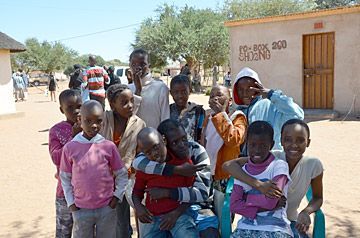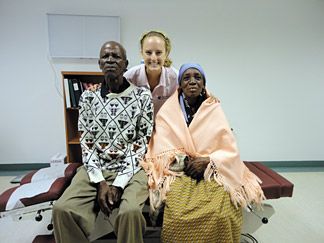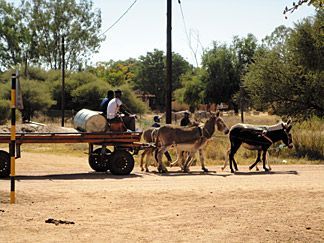It’s a new year and many chiropractors are evaluating what will enhance their respective practices, particularly as it relates to their bottom line. One of the most common questions I get is: “Do I need to be credentialed to bill insurance, and what are the best plans to join?” It’s a loaded question – but one every DC ponders. Whether you're already in-network or pondering whether to join, here's what you need to know.
Pursuing a Purpose: My Botswana Experience With World Spine Care
Finally, the day was here: I was graduating from Cleveland Chiropractic College. Eight years of rigorous biological sciences and chiropractic studies were over! I had just finished the elite internship at Walter Reed National Military Medical Center, where I gained incredible clinical experience and mentorship under the supervision of Dr. William Morgan. I was at the top of my class and expectations were high.
Pursuing a Purpose
"What? You're going to Botswana, Africa for two months to volunteer?" The state of confusion and concern was one only a parent's face could portray. Suddenly the conversation at the dinner table was silenced, a rarity at the Potthoff family farm. I calmly explained to my mother, father, younger sisters and brother that I had decided to volunteer for World Spine Care, a nonprofit organization that specializes in evidence-based integrative prevention, assessment and treatment of spinal disorders and musculoskeletal conditions.
My desire to participate began three years ago when I first heard Dr. Geoff Outerbridge speak about World Spine Care at a seminar. A few months later, I met WSC Founder Dr. Scott Haldeman and my interest for the organization grew. I stayed in communication with Dr. Haldeman afterward, inquiring about ways to promote World Spine Care and how I could get involved.

Now, back to my family. Eventually, the enthusiasm in my voice softened the stern looks from across the table. The tension in the air eased when I mentioned the generous monetary support from Dr. Carl Cleveland, Dr. Hugo Gibson, and a few other local chiropractors to make my mission fiscally possible. My parents were familiar with my nontraditional chiropractic aspirations that supported my African integrative health care adventure. Ignited in my first year of chiropractic college, I had developed a passion for noninvasive medical options within hospitals.
My purpose led me down the path less traveled in the chiropractic profession, as I sought to better understand the integration of chiropractic care within the medical model. Throughout my studies, I had discovered the unmet need for complementary and alternative medicine in America's failing health care system, particularly for low back pain and many musculoskeletal conditions. Reinforced by the inspiring internship at Walter Reed, I graduated searching for a position within a hospital or multidisciplinary clinic.

Another reason why I jumped for joy when I heard of the World Spine Care opportunity – it didn't matter that I had to fly halfway across to the world – was that I would be able to serve others and practice chiropractic within the clinical setting I had always envisioned.
Flashbacks of previous medical outreach work in my undergraduate years also played a role in my decision to volunteer in Africa. I had studied environmental health and justice at the Cluj-Napoca Medical University in Romania and provided dental health education to the Roma communities. Through this experience, I witnessed the burden of spinal conditions upon developing countries, especially during my outreach work in the Roma communities. I was awestruck by the physical ailments and disability in this population.
My studies in Romania made me aware of the issues physical disability could cause. Economic problems due to manual labor being the population's primary source of income heightened the dilemma of chronic low-back and neck pain. My Romanian experience pushed my instinct to get involved in World Spine Care.
Making a Difference

Two months later, as I travel back to the states from Mahalapye, Botswana, the awkward dinner conversation and my parents' apprehension are afterthoughts. My World Spine Care experience provided me with some of the most incredible clinical, cultural and personal experiences of my life. Educated in the WSC evidence-based model, I gained insight into the Botswana health care system while treating patients at the Mahalapye District Hospital. Daily encounters providing both clinical and cultural challenges enlightened my perspective on international integrative health care.
Beyond the walls of Mahalapye Hospital, I assisted in the further development, testing and documentation of World Spine Care protocols. These protocols will soon be implemented in the WSC clinic in Shoshong, a rural village about 35 kilometers outside Mahalapye. The clinic in Shoshong serves as a pilot project for World Spine Care, providing multidisciplinary spinal care services previously unavailable for this population. The Shoshong Project will also conduct extensive research including pre- and post-epidemiological studies.
Meanwhile, through constant review of protocols and procedures, a universal model of care for spinal disorders will be developed. Such an international model for the screening, assessment, and management of spinal disorders remains an unformed entity in today's' medicine; it is imperative to bring spinal care to the world's most disadvantaged, and to better understand the physiology and pathology of the spine.
World Spine Care offers volunteer opportunities not only for chiropractors, but also orthopedic spine surgeons, neurosurgeons, psychiatrists, and rheumatologists. WSC clinics will be staffed by clinicians who specialize in low-cost, low-tech, evidence-based protocols including education, exercise and manual therapies. Conditions that require secondary or tertiary care will be referred to medical specialists in the participating country or to World Spine Care volunteer specialists recruited for short, specific time frames.
On top of offering high-quality, patient-centered spinal and musculoskeletal care to the underserved areas of the world, World Spine Care offers the chiropractic profession something very special: the opportunity for chiropractors to be recognized as primary care spine specialists within the medical model. Chiropractors have the international exposure to be integrated into countries' medical models where the profession is relatively new. Free of the historical barriers that impair chiropractors in the U.S., WSC offers a healthy and prosperous environment within the medical mode, setting a precedent for the future of chiropractic on an international level.
World Spine Care gave me the chance to heal the sick, promote my profession and gain multidisciplinary clinical experience. It also exposed me to the development of multicultural protocols and gave me the opportunity to absorb the Botswana culture. As odd as it may sound, I left sub-Saharan Africa feeling more freedom and excitement for my future than ever before, both personally and professionally. The people of Botswana taught me to be grateful and also to see opportunity. I carry these invaluable lessons with me, and I hope my experience foreshadows many more such opportunities for our profession.
World Spine Care is a multinational, nonprofit organization driven to fill the gap in the treatment of spinal disorders in the developing world. The model WSC clinic is located in Shoshong, Botswana. For additional information, read "Bringing Primary Care Chiropractic to the World" in the May 6, 2011 issue of DC. Please join the World Spine Care effort by visiting www.worldspinecare.com and clicking on the red "Become a Member" button.



